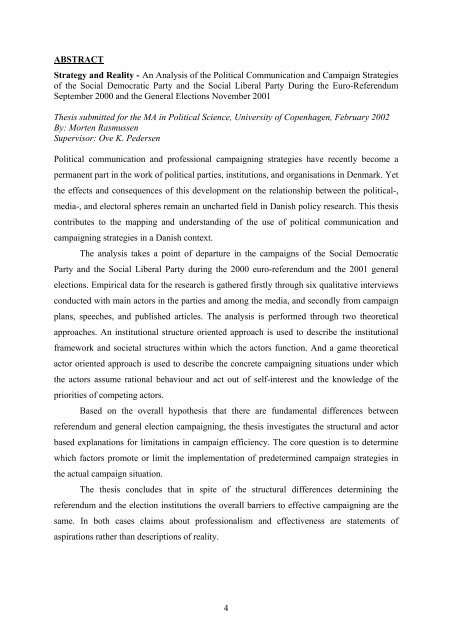Strategi og virkelighed - politiskkommunikation.dk
Strategi og virkelighed - politiskkommunikation.dk
Strategi og virkelighed - politiskkommunikation.dk
You also want an ePaper? Increase the reach of your titles
YUMPU automatically turns print PDFs into web optimized ePapers that Google loves.
ABSTRACT<br />
Strategy and Reality - An Analysis of the Political Communication and Campaign <strong>Strategi</strong>es<br />
of the Social Democratic Party and the Social Liberal Party During the Euro-Referendum<br />
September 2000 and the General Elections November 2001<br />
Thesis submitted for the MA in Political Science, University of Copenhagen, February 2002<br />
By: Morten Rasmussen<br />
Supervisor: Ove K. Pedersen<br />
Political communication and professional campaigning strategies have recently become a<br />
permanent part in the work of political parties, institutions, and organisations in Denmark. Yet<br />
the effects and consequences of this development on the relationship between the political-,<br />
media-, and electoral spheres remain an uncharted field in Danish policy research. This thesis<br />
contributes to the mapping and understanding of the use of political communication and<br />
campaigning strategies in a Danish context.<br />
The analysis takes a point of departure in the campaigns of the Social Democratic<br />
Party and the Social Liberal Party during the 2000 euro-referendum and the 2001 general<br />
elections. Empirical data for the research is gathered firstly through six qualitative interviews<br />
conducted with main actors in the parties and among the media, and secondly from campaign<br />
plans, speeches, and published articles. The analysis is performed through two theoretical<br />
approaches. An institutional structure oriented approach is used to describe the institutional<br />
framework and societal structures within which the actors function. And a game theoretical<br />
actor oriented approach is used to describe the concrete campaigning situations under which<br />
the actors assume rational behaviour and act out of self-interest and the knowledge of the<br />
priorities of competing actors.<br />
Based on the overall hypothesis that there are fundamental differences between<br />
referendum and general election campaigning, the thesis investigates the structural and actor<br />
based explanations for limitations in campaign efficiency. The core question is to determine<br />
which factors promote or limit the implementation of predetermined campaign strategies in<br />
the actual campaign situation.<br />
The thesis concludes that in spite of the structural differences determining the<br />
referendum and the election institutions the overall barriers to effective campaigning are the<br />
same. In both cases claims about professionalism and effectiveness are statements of<br />
aspirations rather than descriptions of reality.<br />
4


